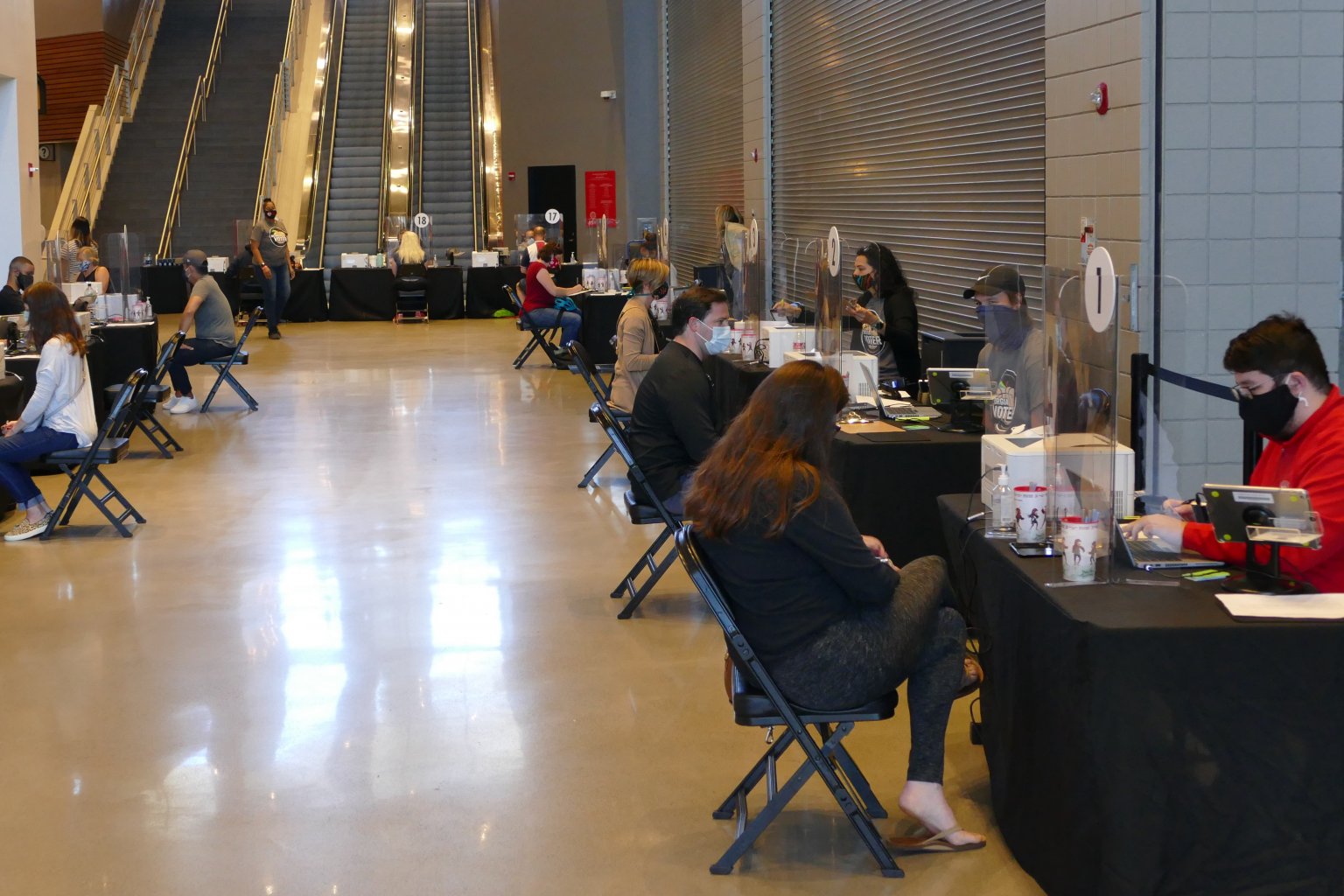
A record-smashing 1.5 million Georgians voted early at precincts at last count Thursday and another 872,000 cast absentee ballots by mail, both approaches encouraged by election officials to avoid the long lines that made the state’s primary election nationally notorious.
But when early voting ends next Friday, will the state and county’s ramped-up efforts to avoid the shortage of poll workers that plagued the June 9 primary be enough? What happens when retrofitted early voting precincts like the arena where the Atlanta Hawks play are no longer available on Nov. 3 to move Election Day crowds along and give poll workers wide open spaces to keep the lines moving?
A record 5 million Georgians are expected to vote by the time the polls close Nov. 3. The Georgia secretary of state’s office created an online portal to help counties recruit a younger set of poll workers for Election Day after older workers who typically staff elections stayed away from precincts June 9, worried about contracting the coronavirus.
Georgia’s county election officials report that the secretary of state’s recruitment help is getting them close to the poll staffing they hope will get voters in and out without hours-long waits that occurred again during the first days of Georgia’s early voting starting Oct. 12.
State, county officials, and election rights organizations attributed the lengthy waits at the outset of early voting to the heightened interest in a pivotal election, keeping people socially distanced and some technical glitches. Turnout was also up about 150% since it started last week compared to 2016.
But county election officials sound a note of optimism that they’ll be able to avoid a repeat of June. 9 and Oct. 12 with a better trained army of poll workers.
Gwinnett County is still recruiting poll workers online to add about 300 more poll workers to the 3,000 election officials hope will show up at precincts at 7 a.m. Nov. 3.
“That’s not too far off of our normal pace,” Gwinnett spokesman Joe Sorenson said. “We continue recruitment up to Election Day for every election. We need poll workers to make sure that voters have the smoothest voting experience possible.”
Finding enough poll workers is difficult enough during ordinary times, but with this year’s COVID-19 health crisis, the fresh faces provided by the secretary of state to help voters cast a ballot are mission critical, said Paulding County Elections Supervisor Deidre Holden, who is also co-president of the Georgia Association of Voter Registration and Election Officials.
“From the moment they get out of their vehicle, they are greeted by a parking lot attendant, then by the greeter and line worker to make sure that they are in the correct polling location,” Holden said. “We want to make sure that we have enough poll workers to cover the areas that are critical to having a successful election day.”
Paulding has 400 poll workers ready to deploy on Election Day and another 130 prepared to step in to cut back on delays caused by people canceling their absentee ballots or by balky voting equipment.
Voters who requested absentee ballots and later opted to vote in person created some of the long lines in both the primary and early voting at precincts because poll workers take more time to process a cancellation before someone can make selections on the state’s new touch screen machines.
Through its online poll worker recruiting outreach started late summer, Secretary of State Brad Raffensperger’s office sent counties the names of about 49,000 Georgians interested in becoming poll workers.
Raffenspeger’s office also recruited election workers by partnering with multiple businesses and organizations like the Georgia Municipal Association and chambers of commerce. The American Civil Liberties Union of Georgia signed up 2,000 people through its poll worker program.
Other organizations marshaling forces to staff precincts on Nov. 3 include Power the Polls and the Georgia Youth Poll Worker Project. And thousands of younger, more tech-savvy workers will be paid to better handle potential technical problems with Georgia’s new $104 million voting system.
In Bibb County, Power the Polls, a coalition of businesses and nonprofits that’s signed up 33,600 Georgians as poll workers, is still recruiting via text messages. Bibb election officials might entice people to work at the county’s precincts by using a portion of a $557,000 grant to provide extra hazard pay as a sweetener.
Long lines formed before polls opened at 7 a.m. June 9 in about 20 Georgia counties, but Fulton County’s painful primary election waits sometimes lasted until after midnight, spurring investigations into what went wrong.
Fulton Elections Director Richard Barron said the county is now gearing up for Nov. 3 to avoid a repeat of June’s primary headaches. Election training for poll workers will continue until Nov. 1. Fulton hopes its plan to post 3,200 poll workers at precincts, assign a deputy registrar at each location to cancel absentee ballot applications, and reserve 200 county employees ready to swoop in to troubleshoot problems will suffice.
James Hammond, a Fulton County voter turned into a one-man poll worker recruiting army following the June primary, will be working as a poll manager Nov. 3 along with a group of friends he brought along. The managing partner with Ikon Filmworks said he expects plenty of challenges come Election Day but is determined to make the best of the expected crush of voters.
“We will have high spirits and strive to deliver the best service to everyone that comes through our doors,” Hammond said. “Yes, there will be some confusion but we will give 110% effort to ensure we get the job done effectively, efficiently and as positively as possible.”
_____________________________________________________________________________________________________________________________________________
What it takes to be a Georgia poll worker for the Nov. 3 election
To become a poll worker, you must be 16 or older and live in or work for the county where you want to help voters.
You must be able to read, write, and speak English.
The state is helping recruit poll workers, but Georgia’s 159 counties do the hiring and training. Pay varies from $60 to $140 for the day depending on the county.
You can submit your name to the secretary of state’s online database to sign up, or you can contact your county’s election office directly.







